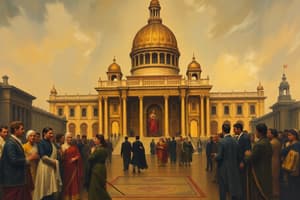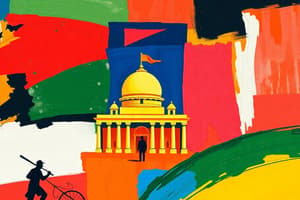Podcast
Questions and Answers
What percentage of votes should a political party get to get the status of a registered party?
What percentage of votes should a political party get to get the status of a registered party?
- 5 percent
- 7 percent
- 6 percent (correct)
- 8 percent
Who administered the oath of office to the Governor?
Who administered the oath of office to the Governor?
- Chief Minister of the State
- President of India
- Chief Justice of the High Court (correct)
- Advocate General of India
What is the full name of the Indian political party 'CPI-M'?
What is the full name of the Indian political party 'CPI-M'?
- Communist Party of India Moderate
- Communist Party of India Main
- Communist Party of India Marxist (correct)
- Communist Party of India Maoist
Who is the highest law officer of a state?
Who is the highest law officer of a state?
What is an example of direct democracy in India?
What is an example of direct democracy in India?
When did the United Nations come into existence?
When did the United Nations come into existence?
Who was the first Election Commissioner of India?
Who was the first Election Commissioner of India?
What is the latest official language of the United Nations?
What is the latest official language of the United Nations?
Who exercises the actual working powers of the state?
Who exercises the actual working powers of the state?
Who was the second Chief Election Commissioner of India?
Who was the second Chief Election Commissioner of India?
Study Notes
Union List and Fundamental Rights
- There are 97 items in the Union List.
- The payment of taxes is guaranteed freedom.
- Article 27 of the Indian Constitution abolishes untouchability.
- Fundamental rights are not given to foreigners (Article 27).
- The right to vote is related to political rights.
Governance and Constitution
- The Indian Constitution has 7 fundamental rights initially.
- The right to freedom is mentioned in Articles 19-22 of the Indian Constitution.
- A writ is issued by any High Court.
- The right to life is a fundamental right.
- The concept of Directive Principles of State Policy was derived from the Irish Constitution.
- Part 4 of the Indian Constitution deals with Directive Principles of State Policy.
Parliament and Vice-President
- The Vice-President is the ex-officio Chairman of the Rajya Sabha.
- The minimum age to become the Vice-President of India is 35 years.
- Dr. S. Radhakrishnan has been the Vice-President of India twice.
- The Vice-President is an integral part of the President of India.
President and Judiciary
- The President of India gets arbitral power to appoint the Prime Minister.
- The President appoints judges of the Supreme Court of India.
- The judges of the Supreme Court retire at the age of 65 years.
- The Supreme Court of India enjoys original, appellate, and consultative jurisdiction.
Cabinet and Citizenship
- The Cabinet is collectively responsible to the Lok Sabha.
- Parliament sets the conditions for obtaining citizenship.
Emergency Powers
- The President of India has emergency powers of three types.
- Financial emergency can be imposed for no maximum period.
- Internal emergency has been implemented only once in India.
Other Key Facts
- The Comptroller and Auditor General was suggested in the Act of 1919.
- The President of India has the same constitutional authority as the British monarch.
- The Prime Minister of India is appointed by a process of appointment.
- The minimum age required to become the Prime Minister of India is 25 years.
- Residual powers vest in the Central Government of India.
- The full name of the Indian political party 'CPI-M' is Communist Party of India (Marxist).
Studying That Suits You
Use AI to generate personalized quizzes and flashcards to suit your learning preferences.
Related Documents
Description
Test your knowledge of the Indian Constitution and civics with this quiz. Questions cover various aspects of Indian democracy and governance.




